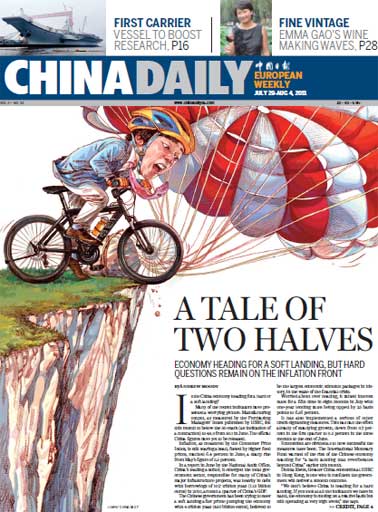Op-Ed Contributors
Debate: High-speed trains
Updated: 2011-07-29 07:49
(China Daily)
Peh Shing Huei
The price of high speed is too high
For years, experts both in China and abroad have been warning that the country's high-speed rail network is careening toward disaster. They have cautioned time and again that high-speed or bullet trains have been going too fast, the network has been expanding too quickly and railway finances are too dodgy.
But the speed-obsessed Chinese rail authorities ignored the naysayers and insisted that China had pioneered a technology that can eventually make trains travel at 500 kilometers an hour - equivalent to the speed of small planes.
Such ambition will head into severe headwinds after the July 23 high-speed train collision in Wenzhou, Zhejiang province, which left at least 39 people dead and nearly 200 injured. It is the first major bullet train accident in China since they were introduced in 2007.
There have been clues that China has compromised safety in the race to build a high-speed rail network of 18,000 km by 2020 - enough to make almost four trips between Beijing and Singapore.
Several media reports have quoted insiders as saying that track construction has not been top-notch in terms of quality. The concrete bases for the tracks, for example, were made cheaply, without sufficient amounts of chemical hardening agents. This means tracks could bend over the years.
High-quality fly ash - a byproduct of burning coal - was almost definitely not used to strengthen the tracks, because the speed of construction has far exceeded its global availability, according to a 2008 study by a Chinese railway design institute.
The construction cycle is considered extremely fast by many experts, too. Contractors are laying rails even though the ministry is still formulating building standards. It takes only two years to build 300 km of high-speed railway in China, but a decade in other countries.
Moreover, when the trains started running, they ran at breakneck speed. Although modeled on Japan's famous Shinkansen design, China's high-speed trains zipped at up to 350 km an hour, more than 25 percent faster than what the Japanese allowed.
In Japan, the oldest and busiest Shinkansen line carries 400,000 passengers a day and has been running since 1964 without a fatal accident, and the average delay is usually around 10 seconds.
It does not help that China's railway finances have been incredibly spotty. A study conducted by China Minsheng Bank last year showed that the ministry's debts equaled 56 percent of its assets and could reach $455 billion, or 70 percent of its assets, by 2020. State auditors discovered that 187 million yuan ($29 million) had been siphoned off from the Beijing-Shanghai project. After that, Liu Zhijun was sacked as railways minister and detained for alleged corruption early this year. The scandal raised further safety concerns, for money meant for the high-speed rail network had instead lined officials' pockets.
But in their eagerness to build a prestige project, the authorities have largely ignored such warnings for years. Furthermore, high-speed railway was seen as providing a useful boost to the Chinese economy during the 2008 financial crisis. The government allocated the lion's share of the 4-trillion-yuan stimulus package to the sector, hoping that it would not only take off at home, but become China's high-tech export too.
China's bullet trains have been competing aggressively with the Europeans and Japanese for contracts in places as diverse as Iran, Russia and even California. It remains to be seen if China's high-speed trains can still conquer the world. But one thing is for certain - they will no longer be breaking world speed records.
The Straits Times/Asia News Network
(China Daily 07/29/2011 page9)
E-paper

Ringing success
Domestic firms make hay as shopping spree by middle class consumers keeps cash registers ringing in Nanjing
Mixed Results
Crowning achievement
Living happily ever after
Specials

Ciao, Yao
Yao Ming announced his retirement from basketball, staging an emotional end to a glorious career.

Going the distance
British fitness coach comes to terms with tragedy through life changes

Turning up the heat
Traditional Chinese medicine using moxa, or mugwort herb, is once again becoming fashionable
